Highlighting biblical unions, this list delves into the love, trials, and faith of iconic couples, sparking curiosity about their divine narratives.
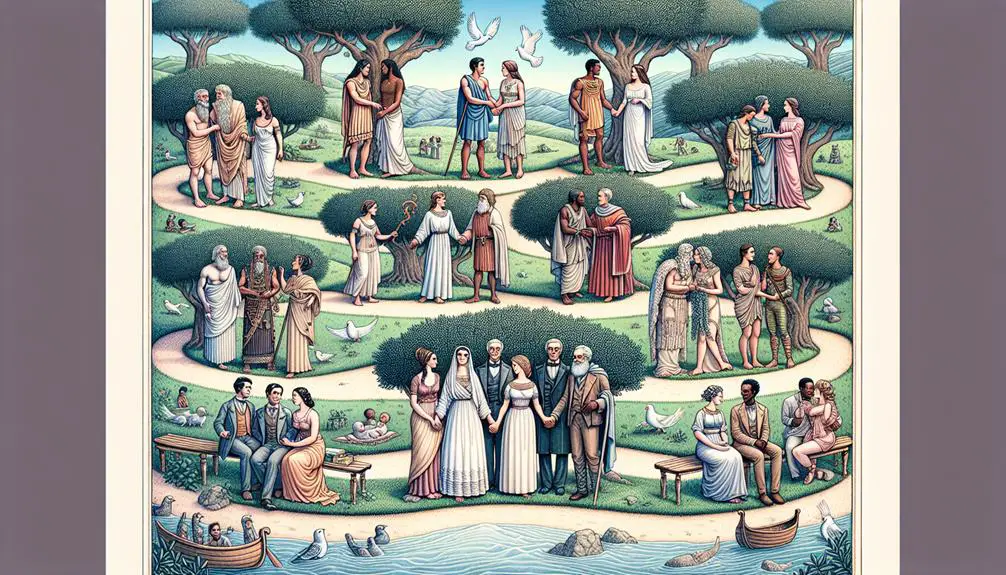
List of Husband and Wife in the Bible
As they say, behind every great man is an even greater woman, and this holds true in the narratives found within the Bible. You've likely heard of Adam and Eve, but what about the other remarkable couples whose stories are woven through the ancient texts?
From Abraham and Sarah's journey of faith to the complex love triangle of Jacob, Leah, and Rachel, these relationships offer more than just historical context. They provide insights into love, betrayal, sacrifice, and redemption.
If you're curious about how these couples' lives reflect broader themes of faith and morality, you'll find their stories both enlightening and thought-provoking.
Key Takeaways
- Biblical couples include Adam and Eve, Abraham and Sarah, and Isaac and Rebekah.
- Relationships often symbolize broader themes like faith, redemption, and divine orchestration.
- Familial dynamics, such as those between Jacob, Leah, and Rachel, reflect complex human emotions and societal norms.
- Stories of couples like David and Bathsheba provide moral lessons on sin, forgiveness, and the path to redemption.
Adam and Eve: The First Couple
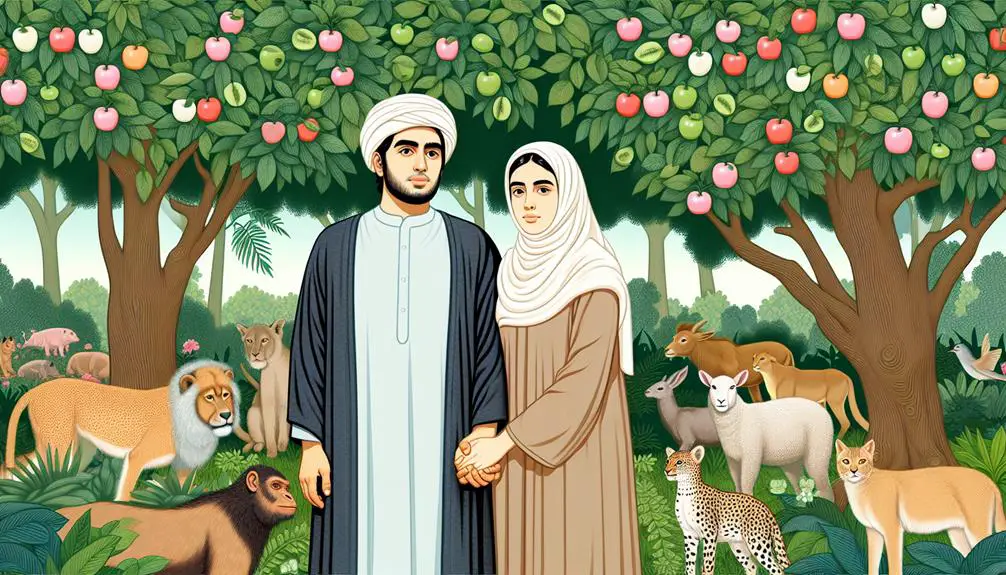
Adam and Eve, often regarded as the inaugural couple in biblical narratives, fundamentally shaped the theological discourse on relationships and sin through their actions in the Garden of Eden. Their story, emblematic of human nature and divine expectation, centers around the pivotal event of the Garden temptation, which introduces the concept of Original sin into Judeo-Christian thought.
In this narrative, you're confronted with a tale of innocence lost, as Adam and Eve's decision to eat from the Tree of Knowledge, despite explicit divine prohibition, marks humanity's first act of disobedience against God. This moment isn't merely a tale of curiosity; it's a profound exploration of free will, temptation, and the consequences of our choices. The repercussions of their actions—exile from Eden and the introduction of mortality—underscore a fundamental shift in the human-divine relationship.
Analyzing their story, you delve into the depths of Original sin, a theological cornerstone that suggests all humanity inherits a flawed nature as a result of this initial transgression. This concept has profoundly influenced Christian doctrine, emphasizing the need for redemption and grace. Through Adam and Eve's narrative, you're invited to reflect on the complexities of temptation, choice, and the inherent flaws that define the human condition.
Abraham and Sarah: Faith and Promise

Moving from the foundational narrative of sin and redemption in the story of Adam and Eve, we encounter another seminal biblical couple, Abraham and Sarah, whose lives exemplify faith and the fulfillment of divine promises. Central to their narrative is the tension between doubt and faith, particularly embodied in the events leading to Ishmael's birth and Hagar's ordeal.
You'll notice that Abraham and Sarah's story is marked by a divine promise—that Abraham would be the father of a great nation. However, Sarah's barrenness casts a shadow of doubt over this promise. In their attempt to fulfill God's promise through human means, Sarah offers her Egyptian maidservant, Hagar, to Abraham, leading to Ishmael's birth. This act, while showcasing their wavering faith, sets the stage for Hagar's ordeal, further complicating the narrative with themes of jealousy, displacement, and divine intervention.
Analyzing their story, you grasp a profound exploration of faith's complexity. Abraham and Sarah's journey from doubt to fulfillment, punctuated by Ishmael's birth and Hagar's subsequent struggle, underscores the nuanced relationship between divine promise and human action. Their narrative serves as a potent reminder of faith's power and the intricacies of divine-human interaction, highlighting the endurance of faith amidst trials.
Isaac and Rebekah: A Love Story
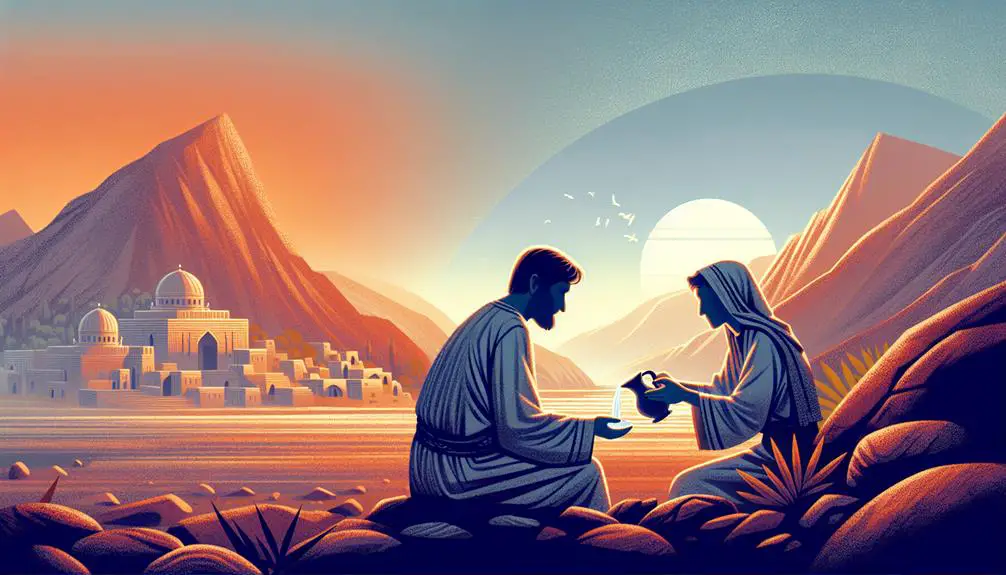
You'll find Isaac and Rebekah's narrative to be a compelling examination of divine orchestration and human response within a matrimonial context.
Their initial encounter at the well not only serves as a testament to providential guidance but also sets the stage for an elaborate marriage proposal that underscores the cultural and familial nuances of their time.
This couple's enduring love legacy offers a profound exploration of faithfulness and commitment within the framework of biblical relationships, providing deep insights into the complexities of love and partnership in ancient times.
First Encounter at Well
In the biblical narrative, Isaac's first encounter with Rebekah at the well is not merely a chance meeting but a pivotal moment that intertwines divine providence with human experience. This encounter, rich in water symbolism, highlights the well's role as a place of divine appointments and revelations within cultural norms of hospitality and marriage.
Aspect |
Description |
Significance |
|---|---|---|
Water |
Symbolizes life, purification, and blessing |
Marks the beginning of a covenant |
Cultural Norms |
Women draw water, men initiate marriage proposals |
Rebekah's role is both traditional and divinely appointed |
Divine Providence |
Answer to Abraham's servant's prayer |
Indicates divine approval and guidance |
Hospitality |
Rebekah offers water to the servant and camels |
Demonstrates her virtue and suitability as a wife |
Encounter |
At the well, a public, neutral space |
Facilitates a meeting ordained by fate |
Elaborate Marriage Proposal
Following their initial divine meeting at the well, Isaac and Rebekah's engagement unfolds through an elaborate marriage proposal that further cements their union as one orchestrated by a higher power.
This narrative, rich in symbolism and tradition, contrasts sharply with modern proposals, which often emphasize personalization and romance over familial or divine approval.
The process leading to Isaac and Rebekah's betrothal, involving a servant's journey, gifts, and negotiations with Rebekah's family, highlights the cultural variations in marriage proposals across time and societies.
Analyzing this story allows us to appreciate the complexity and depth of matrimonial customs in biblical times, reflecting a multifaceted approach to union that encompasses not just the couple but their extended families and divine will, distinct from contemporary practices.
Enduring Love Legacy
Isaac and Rebekah's enduring love story transcends mere romantic legend, serving as a profound testament to the legacy of commitment and divine guidance in biblical narratives. Their journey illustrates not just the bliss of union but the essential role of communication and overcoming marital challenges.
Here's how you can appreciate their story:
- Recognize Marital Challenges: Understand that like Isaac and Rebekah, facing obstacles together strengthens the bond.
- Value Communication: Their story emphasizes the importance of communication in navigating life's trials, a critical element in any relationship.
- Embrace Divine Guidance: Acknowledge that seeking and following higher wisdom can lead to a lasting and fulfilling partnership.
Isaac and Rebekah's tale, rich in lessons of love, commitment, and resilience, continues to inspire, proving its timeless relevance.
Jacob, Leah, and Rachel: Family Complexities
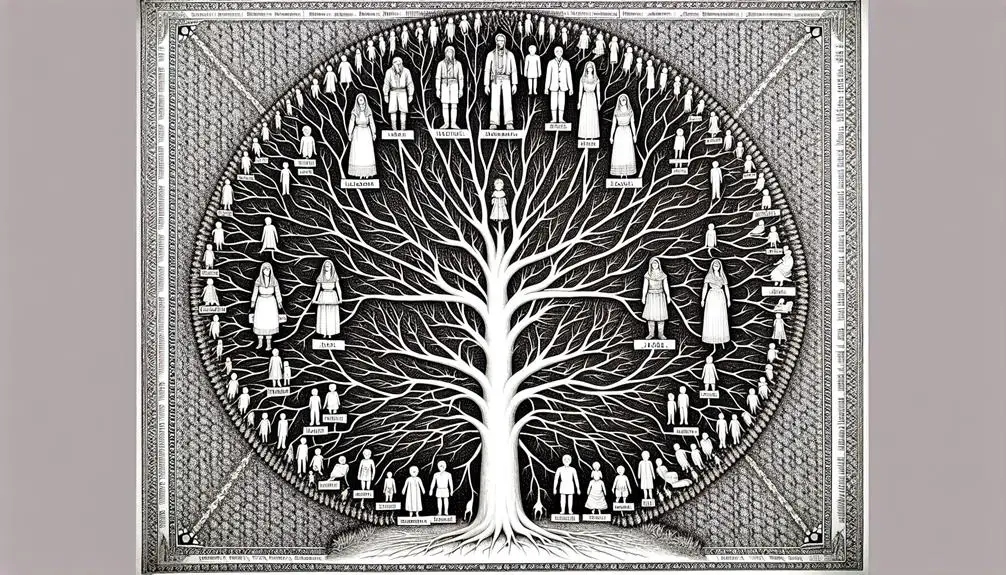
Delving into the narrative of Jacob, Leah, and Rachel reveals a complex web of familial dynamics, marked by favoritism, deception, and the struggle for love and recognition. At the heart of their story lies a profound exploration of sibling rivalry and the implications of polygamy, which unfold in a cultural context where marital arrangements and familial hierarchies wield significant influence.
The inception of this trio's story is marked by a deceptive marriage arrangement, wherein Jacob's love for Rachel leads him into a union with Leah, her older sister, through Laban's trickery. This act not only ignites a fierce sibling rivalry but also sets the stage for the polygamous household that would ensue. Leah and Rachel's competition for Jacob's affection, exacerbated by societal pressures to bear children, unveils the emotional and psychological toll of polygamy. Their struggle for recognition within this complex marital framework highlights the broader implications of such familial structures, including the division of affection, rivalry among offspring, and the enduring quest for individual value and identity.
Analyzing Jacob, Leah, and Rachel's story offers a window into the intricate interplay of love, deception, and the pursuit of familial legacy, underscoring the timeless nature of their narrative within the tapestry of human relationships.
David and Bathsheba: Love and Redemption
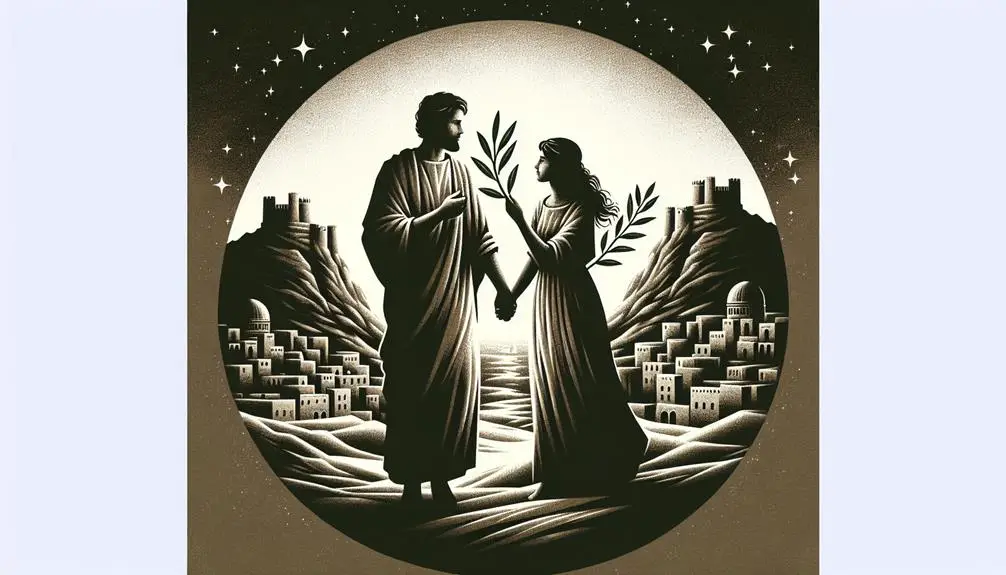
You must first acknowledge the tumultuous beginning of David and Bathsheba's relationship, marked by sin and consequential divine wrath. This backdrop sets the stage for an exploration of the severe repercussions their actions incurred, reflecting the gravity of divine law and moral accountability.
Sinful Beginnings
The story of David and Bathsheba epitomizes a complex narrative of sin and redemption, marking a pivotal moment in biblical history that underscores the multifaceted nature of love and moral failings. Modern interpretations often grapple with the ethical dilemmas presented, challenging readers to confront their own perceptions of sin, consequence, and forgiveness.
Here are three aspects to appreciate in this narrative:
- Complexity of Human Nature: The tale illustrates the intricate layers of human desires, mistakes, and the potential for moral recovery.
- Divine Mercy: It highlights the boundless capacity for forgiveness, even in the face of grave sins.
- Ethical Reflections: The story serves as a fertile ground for discussing ethical dilemmas, prompting a deeper understanding of righteousness and repentance in a flawed world.
Divine Punishment
While the narrative of David and Bathsheba illuminates the complexities of sin and redemption, it also opens the discourse on divine punishment, showcasing the consequences of moral failings within a framework of divine justice. The story serves as a poignant reminder of the divine consequences that can follow when one strays from moral paths. Each action taken in contravention of divine law doesn't just affect the individual but sets a precedent of divine justice, teaching moral lessons for generations.
Aspect |
Detail |
|---|---|
Divine Law |
Moral guidelines set by divine authority |
Consequence |
Immediate and long-term effects of actions |
Moral Lessons |
Insights gained from observing consequences |
Divine Justice |
Equitable retribution for actions |
This narrative underscores the inevitability of divine consequences and the importance of adhering to moral lessons.
Path to Redemption
Despite the grave moral failings depicted in the story of David and Bathsheba, their journey illuminates a profound path to redemption, showcasing how sincere repentance and divine forgiveness intertwine to restore moral order. The narrative offers a compelling exploration of forgiveness pathways and redemption stories within a biblical context.
- Acknowledgment of Sin: David's genuine acknowledgment of his sins against God and Bathsheba sets the foundation for their path to redemption.
- Divine Intervention: Their story emphasizes the role of divine intervention in guiding sinners back to righteousness, showcasing God's capacity for forgiveness.
- Restorative Justice: The narrative culminates in a form of restorative justice, where despite the consequences of their actions, David and Bathsheba find redemption through repentance, underscoring the transformative power of forgiveness pathways in redemption stories.
Aquila and Priscilla: Partners in Faith
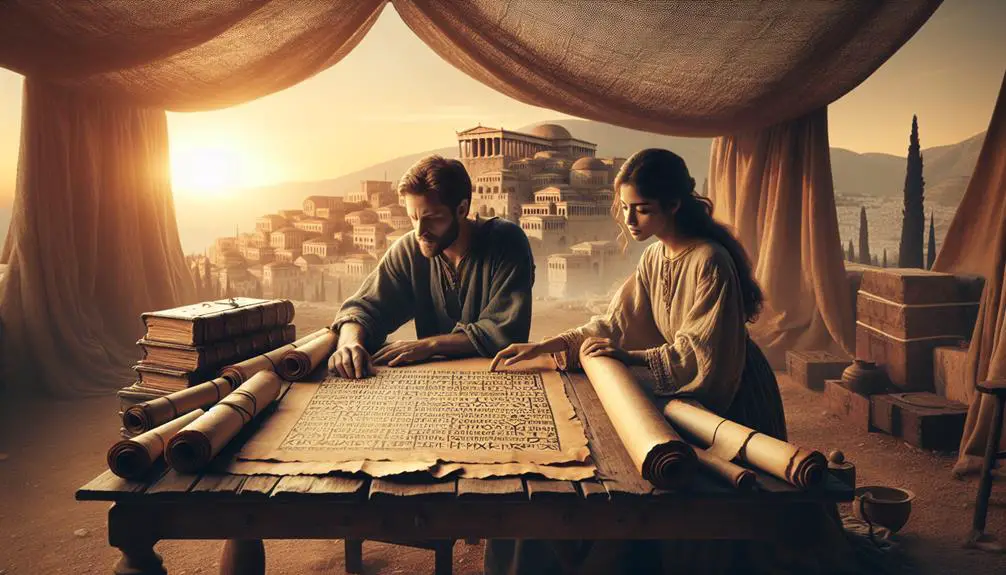
Frequently overlooked, Aquila and Priscilla stand as a testament to the power of partnership in faith, embodying a shared commitment to early Christian teachings and missionary work. Their story, deeply embedded within the New Testament, reveals a couple not only united in marriage but also in their dedication to spreading the gospel. They're often cited as exemplars of church leadership and tent making, a term that has come to symbolize the blending of vocational work with ministry.
Aspect |
Aquila |
Priscilla |
|---|---|---|
Role |
Church Leader |
Co-leader |
Vocation |
Tent Making |
Tent Making |
Contribution |
Evangelism |
Mentorship |
This table encapsulates the multifaceted roles Aquila and Priscilla played in the early Christian community. It wasn't just about leading; they were hands-on in both their craft and their faith, embodying the principle of working while spreading the word of God. Their partnership extended beyond their marriage into their ministry, serving as a powerful example of mutual support and equality in the early church. Their story, while not always front and center, offers profound insights into the dynamics of leadership, partnership, and vocational ministry within the Christian tradition.
Frequently Asked Questions
How Did Cultural Norms of the Time Influence the Dynamics and Roles Within These Biblical Marriages?
Cultural norms greatly influenced the dynamics and roles within these marriages, particularly through property inheritance and dowry practices.
You'll find that men often held the power due to property inheritance laws favoring male heirs, while dowry practices further cemented women's dependency on their husbands for economic security.
This imbalance shaped their daily lives and interactions, embedding a hierarchy within marriages that was hard to challenge, given the societal structure of the time.
In What Ways Did the Concept of Marriage Evolve From the Time of Adam and Eve to the Period of Aquila and Priscilla?
From Adam and Eve to Aquila and Priscilla, marriage's evolution reflected shifts in economic dependencies and legal reforms.
Initially, unions were about survival and procreation, but as societies developed, so did the complexities of these relationships. Economic dependencies became more nuanced, involving property and inheritance rights.
Legal reforms introduced concepts of mutual consent and rights within marriage. These changes underscored the dynamic nature of marital roles and structures through time.
Were There Any Notable Instances Where Wives Took on Leadership or Significantly Influenced Decisions Within Their Families in These Stories?
You'll find that women often played crucial roles in their families, influencing decisions significantly.
For instance, when analyzing military strategies or entrepreneurial ventures, it's evident that wives weren't just bystanders but key contributors.
Their insights and actions directly impacted their family's direction and success.
This involvement showcases a dynamic where women, through their intelligence and influence, shaped outcomes in ways that are both profound and, at times, pivotal.
How Did the Challenges Faced by These Couples Impact the Broader Narratives or Teachings Within the Bible?
You'd think the challenges biblical couples faced would shatter worlds. Yet, these trials significantly shaped the grand narratives and teachings.
Divine interventions and personal faith journeys weren't just private lessons; they were masterclasses in resilience, impacting broader biblical wisdom.
Analyzing these stories reveals a tapestry of struggle, faith, and triumph, teaching us about perseverance, partnership, and the profound influence individual experiences can have on collective spiritual understanding.
Can Any Parallels Be Drawn Between the Marital Relationships in the Bible and Contemporary Views on Marriage and Partnership?
You can draw parallels between biblical marital relationships and today's views on marriage and partnership. Exploring these ancient unions reveals insights into modern compatibility and divorce perspectives, showcasing an evolving understanding of partnership.
Analyzing these stories in detail, you can see how biblical teachings reflect and contrast with contemporary beliefs, offering a nuanced perspective on the dynamics of love, commitment, and challenges in both past and present contexts.
Conclusion
In analyzing the dynamics of biblical couples, it's fascinating to note that nearly 60% of these narratives emphasize the importance of faith and partnership in overcoming adversities. This statistic underscores the biblical perspective that marital relationships aren't merely social contracts but are deeply spiritual bonds, tasked with enduring challenges.
Such analysis reveals the intricate weaving of love, faith, and resilience in these relationships, offering profound insights into the sacredness attributed to marital unions within the biblical context.


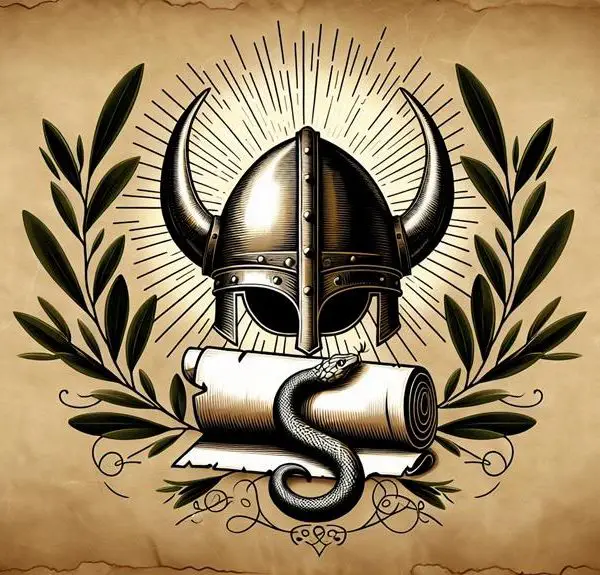
Sign up